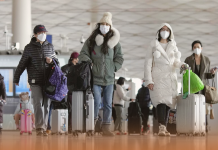As we know, the Coronavirus epidemic forced every person to put mask regularly till that disease go away, so Japanese Donut Robotics marked an opportunity. Japanese developed a smart mask, a high technology upgradation to standard face covering, created to follow social distancing measures more easily and to make communication with others.
In addition to that application, the C Face Smart mask can copy dictation, boosts the voice of the wearer, and even can translate voice into 8 different languages.
A Japanese robotics startup has invented a smart mask that translates into eight language https://t.co/lQcVsYpHxT pic.twitter.com/oC2KVHjIoU
— CNN (@CNN) August 4, 2020
The holes on the front are important for breathing, so the smart face mask does not provide you security from the Coronavirus. Taisuke Ono, the CEO of Donut Robotics, describes that it is developed to be put over a standard face-mask. The smart mask is manufactured from Silicone and White plastic, and it also has a microphone that links via Bluetooth to the smartphone of the wearer. Moreover, it can translate between Chinese and Japanese, Indonesian, English, Korean, Vietnamese, French, and Spanish.
Initially, Donut Robotics made the translation software system for a robot known as Cinnamon, but when COVID-19 hit, that project was postponed for a short period. At that time, the engineers brought the idea to make use of their translation software in a face mask.

Source: Web
Donut Robotics started from a garage
In 2014, Donut Robotics initiated their work in a garage in Kitakyushu city located at Fukuoka prefecture. Furthermore, Ono co-founded the firm with Takafumi Okabe, an engineer, with the vision to change the world with mobile and small communication robots.
With that journey capital investment, both applied for Haneda Robotics Laboratory, a significant step that wanted robots to offer services for visitors at Haneda Airport of Tokyo.
Haneda Robotics Lab’s spokesperson said that robots would occupy the place as a declining workforce of Japan will make it more difficult to recruit human staff.
Besides this, the Donut Robotics Cinnamon robot is developed to offer tourists with effective information and even help people to fin the airport. It was one of the four translation robot prototypes opted by that project in 2016. Haneda Robotics Lab describes that Cinnamon beat the high competition due to its appealing visuality and user-friendly interface and that translation software acted well in noisy areas.
This big victory encouraged the firm to relocate to Tokyo and add 3 new team members. One of the people says that the software of Donut Robotics uses machine learning advanced, and they get help from translation specialists and experts in the Japanese language. He said that the technology is much better than Google’s API or many other famous technologies, for Japanese language users that most of the competitor software mainly focuses on translation from and to English.





